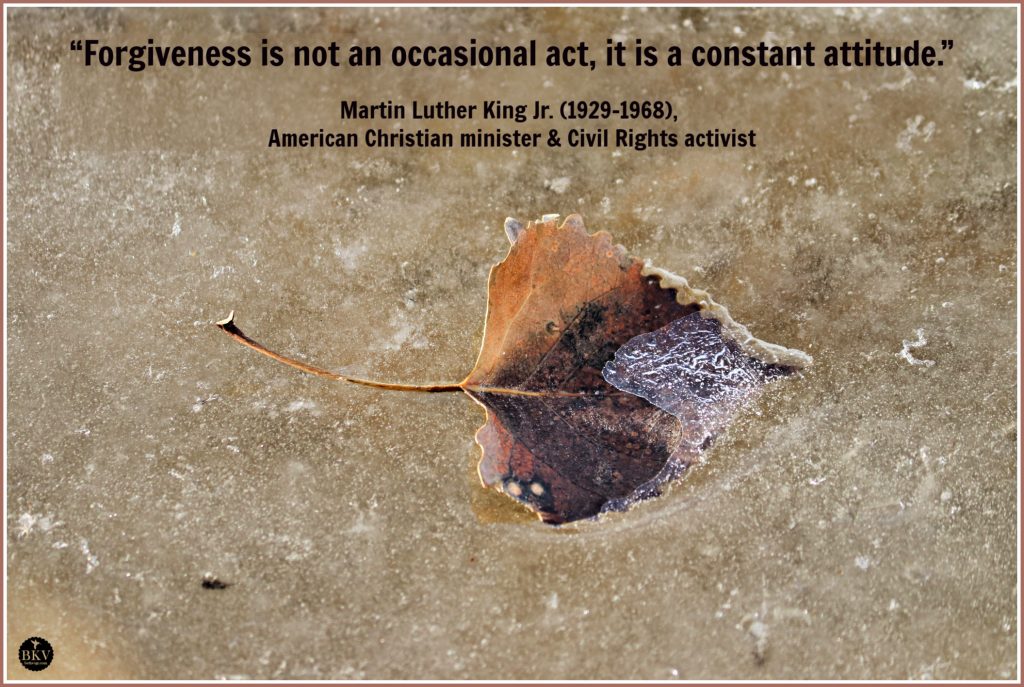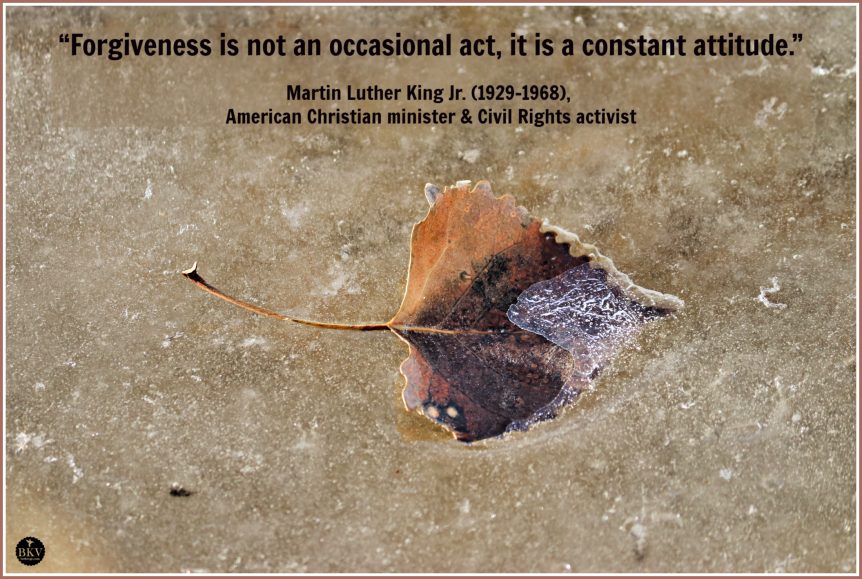
I spent some time yesterday talking with a new friend about forgiveness – both what I’ve learned and what I’ve un-learned about forgiving someone who has hurt me.
As we talked, she mentioned the words, “Forgive and forget.”
I’m not a fan of those three words.
Please, don’t misunderstand me.
I value forgiveness. Reconciliation is my favorite word in the Bible – it’s the core truth in all of Scripture.
I’ve fought to understand true forgiveness, sifting through all the definitions and conditions presented to me by experts: authors and teachers and preachers and mentors and counselors.
It’s taken me years to understand forgiveness, to separate truth from personal opinion – my own, as well as others’ ideas about forgiveness.
Too often someone wise – wiser than you, supposedly – demands that you forget an offense. They sum forgiveness up in two steps:
- Forgive
- Forget
It’s as if saying you’ve forgotten the offense proves you’ve truly forgiven the person who hurt you.
Forgiveness does not require forgetting.Some offenses are so grievous they are impossible to forget. Abuse. Neglect. Divorce. Infidelity. Such wounds go soul-deep and can even cause someone to suffer Post Traumatic Stress Disorder (PTSD).
In no way am I suggesting that we wallow in our pain. But demanding an unrealistic expectation that someone forget a life-altering emotional injury hinders someone’s ability to forgive.
It’s vital to realize forgiveness is a process.
Consider this: Let’s say you and your brother were sitting in a tree in your backyard. For some reason, your brother and you got in a fight and your brother shoved you right out of the tree so that you fell to the ground, breaking your leg.
No one in their right mind would tell you, “Don’t worry about getting that leg fixed. Just forget that happened.”
You’re injured. You have a broken leg that requires both medical care and time to heal. Even then, you may always walk with a limp – a reminder of what happened.
But we so often ignore emotional injuries – the broken hearts, the wounded spirits – hidden inside of others and inside of us. We tell others to forgive and forget, instead of remembering that any kind of healing requires time. And even with the passage of time, with healing, our hearts may have an “emotional limp” because of what happened to us. I truly believe this is when we become more compassionate to others.
Forgiveness brings healing – to us, to our relationship with others. But let’s not fall prey to the lie that forgiveness demands some sort of emotional amnesia on our part. Over time the memory will fade, the pain will lessen – thank God.
Start the process of forgiveness where you are today … and be gentle with yourself. You’re healing.
Must We Forget to Forgive? http://bit.ly/30HUF5r #forgiveness #healing Share on X 'Forgiveness is not an occasional act, it is a constant attitude.' Quote by Martin Luther King Jr. http://bit.ly/30HUF5r #forgiveness #encouragement #martinlutherkingjunior Share on X
Comments 17
Good solid post. I respect your experience and insights. We learn from and move on stronger, but the resurrected Jesus had “healed” scars in his hands and feet. I’ve found I’ve been more effective in helping and encouraging people because of some of my scars they’ve recognized as being relatable to their difficult experiences.
Author
Dee: I appreciate your insights, too. I’m thankful for the healing God has wrought in my life — through prayer and counsel and anchoring myself to Truth. And yes, those healed scars allow me to meet others more with compassion and understanding — scar to scar, if you will. (2 Corinthians 1:3-5)
Very true Ms. Beth. We can sometimes never forget what happened to us; but we must always forgive. What I’ve found in life is that when true forgiveness is achieved, God takes away the pain of those memories. For me, I believe God allows me to keep those un-painful memories for two purposes. To remind me of situations where I should proceed with caution and recognizing sometimes hidden needs of others. The second, and most important to me, is to remember what His love has rescued me from. God’s blessings ma’am.
Author
J.D.: You offer such wisdom here, my friend, for why it is beneficial to remember times when we’ve been wounded by the actions of others: caution and compassion. And yes, God does miraculously heal the pain.
Beth, so much wisdom here. I like how you called forgiveness a process at the end of your post. As easy as it would be if forgiveness was a “one-and-done” thing, I’ve found that I have to make the choice to forgive over and over again, each time the offense comes to mind and my heart gets tangled in it. Thank you for sharing your hard-won understanding.
Author
Jeanne: I’ve appreciated the conversations we’ve shared about faith and forgiveness. They’ve helped me untangle my thoughts about the process.
They tell us, be forgiving
and learn, yes, to forget
but there is a cost of living,
I’m not there just yet.
I’ve seen the places dark and fell,
I’ve seen what evil men can do
the stories I will never tell,
the stories that are never through.
And so in wrath I’ll heed the call
when I have caught my breath
and set out beyond the wall
a harbinger of death.
Know that what strong men remember
is the measure of their temper.
Author
Andrew: You’ve penned strong truths today, my friend. Praying for you.
Beth, thank you for the prayers.
Going down fighting. Don’t own a white flag, and can’t spell ‘surendir’.
Thank you for this special message. I have been conflicted in the past, worrying about forgiving and not forgetting. I needed this post today.
Author
Melissa, I’m thankful this post encouraged you. Thanks for joining the conversation.
Oh, my goodness. I have been dealing with this topic forever.
I have a sister who lives by the forgive, forget, and move on ideal.
Me not so much. The heart limp … so real.
Thank you for this message today. I am dealing with multiple life altering wounds that have left me limping along feeling unworthy.
Author
LouAnn: I understand. We often feel pushed — backed into a corner — by others when they demand to “forgive and forget” philosophy. It leaves us no emotional breathing space for healing. That’s why it’s so vital to find your safety net: those people who are safe for you, who understand you and will support you while you heal. It’s not about wallowing in our pain, but allowing time for the process of healing and forgiveness to take place.
Amen! This is such a good post. I have found that in my experience the deeper the wound the longer it takes for healing and forgiveness to emerge. Thank you for this reminder!
Author
L.S.: I agree with your assessment that different wounds require different times to process … we cannot demand someone to grieve a certain way or to forgive on a certain timetable.
Forgiveness allows us to move forward.
Author
Denise: Yes, I absolutely agree that forgiveness allows us to move forward. I also believe that forgiveness is a process and that our progress cannot be dictated by someone else. Grief is personal … and there is no “one size fits all” process. Healing takes time. We all need compassion and grace as we heal.